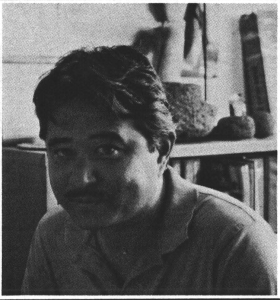William M. Akutagawa, Jr.

Ualapue: Molokai: Oral Histories from the East End
This oral history project was conducted under a contract between the Center for Oral History (COH) of the University of Hawai'i and the Hawai'i Department of Business Economic Development and Tourism (DBEDT) for the purposes of 1) documenting first-hand historical information on 'Ualapu'e Fishpond and the surrounding community to both preserve the cultural integrity of the pond as restoration takes place and to provide educational materials relating to fish pond culture and East End, Moloka'i community history; 2) making this information available to those planning to restore other ponds in the future, as well as to researchers, students and the general public needing information on Moloka'i's social and cultural history; and 3) obtaining from community residents input and reactions regarding the pond's restoration. To explore these interviews and more, https://scholarspace.manoa.hawaii.edu/handle/10125/29789.
William M. Akutagawa, Jr. was born February 18, 1948 on Moloka'i. His late father, William M. Akutagawa, Sr., was the son of Japanese immigrants. His mother, Katharine Hagemann Akutagawa, is the daughter of a German immigrant father and Hawaiian mother. William grew up in KamalO and visited his grandparents in 'Ualapu'e often, spending much of his youth fishing the waters off of 'Ualapu'e Fishpond. He attended Kilohana School and Moloka'i High School, graduating in 1966. He is presently with Alu Like as Training and Employment Coordinator and is chairman of the Board of Directors of Hui o Kuap~.
Scope and Content Note
The interview with William M. Akutagawa, Jr. provides insights into his childhood experiences at 'Ualapu'e Pond on Moloka'i and his efforts to preserve the pond for economic and historical purposes. Akutagawa discusses his memories of fishing and diving at the pond, as well as his involvement in the Hui o Kuap~ organization and the restoration project for the pond. The interview delves into the practical aspects of obtaining permits, securing funds, and the process of restoring the pond, with a focus on its historical and cultural significance. Additionally, Akutagawa shares his vision for the pond's revitalization, including its potential as an educational tool and the marketing economy for the fish and crustaceans that could be raised in the pond.
Program Note:
This interview is part of the Center for Oral History's project ‘Ualapu‘e, Moloka‘i: Oral Histories from the East End. Interviews from this project are available in the Center's ScholarSpace open access repository.
The Center for Oral History (COH), in the Department of Ethnic Studies at the University of Hawaiʻi at Mānoa, collects, documents, preserves and highlights the recollections of Native Hawaiians and the multi-ethnic people of Hawaiʻi. It produces oral histories and interpretive historical materials about lifeways, key historic events, social movements and Hawaiʻi’s role in the globalizing world, for the widest possible use.
Please Note: The oral histories in this collection are protected by copyright and have been created for educational, research and personal use as described by the Fair Use Doctrine in the U.S. Copyright law. Please reach out Voices@noaa.gov to let us know how these interviews are being used in your research, project, exhibit, etc. The Voices staff can help provide other useful resources related to your inquiry.
The NOAA mission is to understand and predict changes in climate, weather, oceans, and coasts, to share that knowledge and information with others, and to conserve and manage coastal and marine ecosystems and resources. The Voices Oral History Archives offers public access to a wide range of accounts, including historical materials that are products of their particular times, and may contain offensive language or negative stereotypes.
Voices Oral History Archives does not verify the accuracy of materials submitted to us. The opinions expressed in the interviews are those of the interviewee only. The interviews here have been made available to the public only after the interviewer has confirmed that they have obtained consent.
